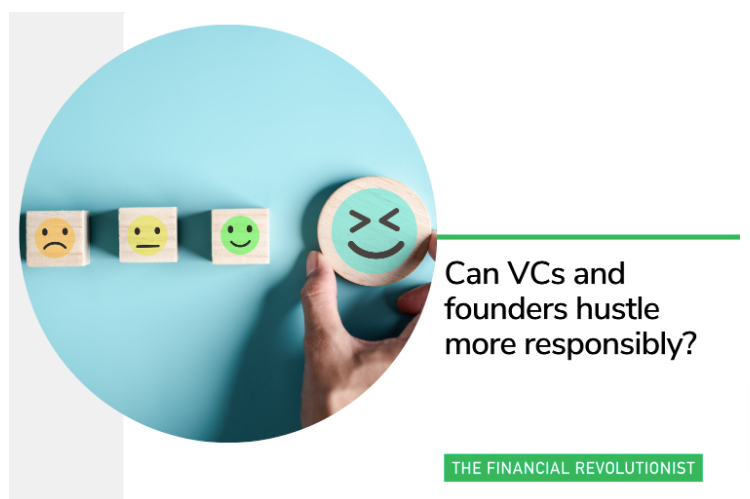Opinion: Can VCs and Founders Hustle More Responsibly?

By Emmalyn Shaw and Lisa Mikkelsen for the The Financial Revolutionist (see original article)
After two trying years of market over-correction, many fintech founders—even those who built profitable, impactful companies—are nearing a personal breaking point. According to a 2024 survey by Sifted of 156 tech founders, 49% are considering quitting this year.
As fintech investors committed to our entrepreneurial ecosystem, we see this as a risk for the sector. It’s time for a different kind of portfolio support.
We’ve heard from entrepreneurs across our network that, despite the market’s slight rebound this year, mental health and work-life balance hurdles have never been more challenging to overcome. Since 2022, when capital retreated and valuations plummeted, many founders told Sifted they are “exhausted” and “broken.”
Startups always go through intense ups and downs, and entrepreneurs expect startup life to be stressful. But this market adjustment came in the midst of the pandemic, and the sociopolitical upheaval that followed.
Many entrepreneurs are experiencing strain compounded by the fundraising environment, layoffs, and personal stress. At a time when entrepreneurs are under so many macro pressures, can we partner with our founders to help them hustle more responsibly?
By that, we don’t mean work less, or simply start everyday with yoga (though adding some movement or mindfulness practice always helps). Rather, we’re seeking opportunities to support our founders and drive candid exchanges regarding their greatest challenges on business and personal fronts—and how those difficulties are affecting their wellbeing.
Where investors can help
There are important things founders can do to take care of themselves. In 2019, we built a resource center for our network called Flourishing Founders that includes coaching, CEO Circles, tips for mindfulness, better relations with boards and other healthy practices.
But we don’t want this to be another checklist VCs give to already-stretched founders. It would be a missed opportunity to ignore the power dynamics of the founder-funder relationship. To support founders through the strain they’re feeling now, VCs can learn from the leadership and team-building work that so many of us have initiated within our own funds.
A lot of that work started with Google’s Project Aristotle. The business world’s understanding of what makes teams effective was upended in 2016, when Google released the results of that companywide research. The key was psychological safety.
That was the one factor that consistently determined which teams performed best, more than individual skill, team size, tenure, or even the workload. As defined by Harvard Business School professor Amy Edmondson, psychological safety takes hold when safe team members feel taking risks, pointing out potential problems, and suggesting new ideas.
Sound familiar? Those are all the things that we want to help our founders do—and we can use the same tips to create psychological safety with the leaders of our portfolio companies.
Creating psychological safety between founders and funders
As Daniel Coyle showed in his 2018 book The Culture Code, leaders need to create safety for others to share bad news or surface problems. Like managers with their teams, funders often need to send CEOs more signals that this is okay.
“It’s important not simply to tolerate the difficult news, but to embrace it,” as Coyle says. Creating a culture of trust and openness is essential for effective problem-solving—especially if the problems are personal, including burnout and worsening mental health.
As board members and mentors, we add value by helping brainstorm, suggesting solutions and offering different perspectives. We need openness and transparency to do that. We often need to remind founders that it’s okay to tell us they’re not doing well, they’re worried about the company, or it’s getting too much for them.
And of course, it’s not always easy for investors to establish personal rapport with a dozen different founders across the portfolio. Sometimes, letting entrepreneurs know we’re human too—flaws and all—is enough.
Just as Google managers learned during Project Aristotle, vulnerability can be a powerful leadership tool. Naming your own emotions validates what other people are feeling. Both of us have recommended coaching to founders, and we both work with coaches ourselves. We’ve recommended CEO Circles, and we have both joined peer groups like YPO and Chief where we can talk with other VCs and HR leaders about our personal and professional challenges.
It’s important that we walk the walk, instead of simply telling founders to go work on themselves. But also, we’ve found that opening up about our lives makes it safer for founders to let us know when they are worried about their own health and wellbeing.
Despite the challenges, fintech founders continue to drive transformation
Just as in the workplace, building psychological safety between investors and founders does not mean relaxing standards for performance or a lack of accountability. It simply means, we can identify a problem and work on it together.
While fintech professionals have been through a lot in the last few years, our community has created transformational solutions and significant value since the sector took off in the early 2010s. Fintech is still one of the top targets for venture funding, and opportunities for exits look promising this year.
Fintech has forever changed the financial system, lowering costs, improving services, and making millions of people and businesses better off. We should be honest about our challenges and successes. We’re a team, and we’re winning.